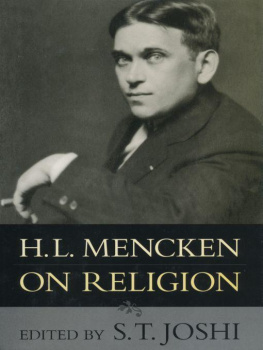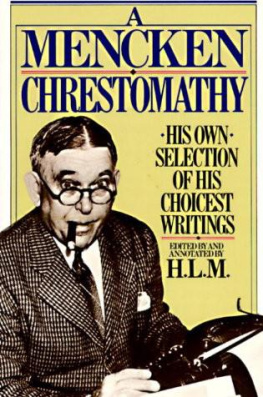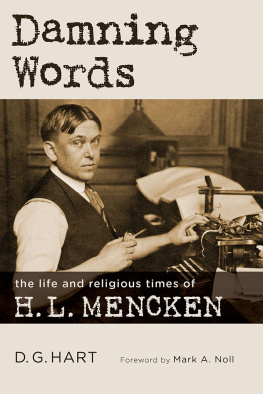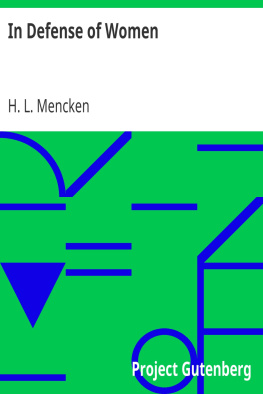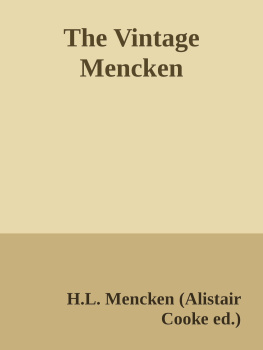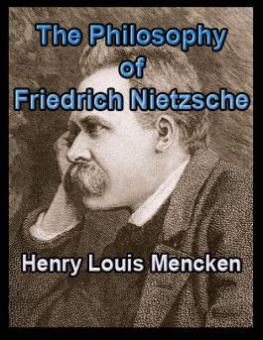Table of Contents
All works by H. L. Mencken are reprinted by permission of the Enoch Pratt Free Library of Baltimore, in accordance with the terms of the will of H. L. Mencken.
Published 2002 by Prometheus Books
H. L. Mencken on Religion. Copyright 2002 by S. T. Joshi. All rights reserved. No part of this publication may be reproduced, stored in a retrieval system, or transmitted in any form or by any means, digital, electronic, mechanical, photocopying, recording, or otherwise, or conveyed via the Internet or a Web site without prior written permission of the publisher, except in the case of brief quotations embodied in critical articles and reviews.
Inquiries should be addressed to
Prometheus Books
59 John Glenn Drive
Amherst, New York 14228-2197
VOICE: 716-691-0133, ext. 207
FAX: 716-564-2711
WWW.PROMETHEUSBOOKS.COM
06 05 04 03 02 5 4 3 2 1
Library of Congress Cataloging-in-Publication Data
Mencken, H. L. (Henry Louis), 1880-1956.
H. L. Mencken on religion / edited by S.T. Joshi. p. cm.
Includes bibliographical references and index.
ISBN 1-57392-982-4 (alk. paper)
1. ReligionControversial literature. 2. ChristianityControversial literature. I. Title: On religion. II. Joshi, S. T., 1958- III. Title.
BL2775.3 M46 2002
200dc21
2002072443
Printed in Canada on acid-free paper
INTRODUCTION
H enry Louis Mencken (1880-1956) was one of the last American intellectuals to speak out forcefully, pungently, and satirically against the follies of religion. In the course of a long career as journalist, essayist, and social commentator, Mencken relentlesslybut always with a liberal dose of wit, persiflage, and dry humorexposed the multitudinous absurdities presented to his gaze by a country in which Fundamentalists, Christian Scientists, theosophists, and religionists of every other creed and sect cavorted before a populace too foolish and credulous to detect the logical fallacies and contradictions to known fact that every religion offers in such abundance. Himself a theological moronone who was absolutely devoid of what is called religious feelinghe could gaze with insouciance and bland objectivity at the circus-show offered by American religion.
Mencken speaks of his own religious upbringing in The Schooling of a Theologian (1939), testifying that his father, an avowed unbeliever, enrolled Mencken and his brother Charlie in a Methodist Sunday school for the sole purpose of having his own afternoons free for a nap. After all, the two hours a week spent in this school could be easily counteracted by the influence of the infidel Papa Mencken the rest of the time. Mencken claimed to be relatively impartial on the subject of religionI am anything but a militant atheist and havent the slightest objection to church-going, so long as it is honest, he wrote in Confessions of a Theological Moron (1920)but the course of his literary work makes it plain that he sided with heretics on the great majority of issues where religion came into conflict with science, politics, and the advance of civilization.
The fundamental tenet of Menckens thought is libertarianism, in the purest sense of the term: I am, in brief, a libertarian of the most extreme variety, and know of no human right that is one-tenth as valuable as the simple right to utter what seems (at the moment) to be the truth. Take away this right, and none other is worth a hoot; nor, indeed, can any other long exist. This remark was made in the context of literature and literary criticism, but its implication is clearly broader than that. What Mencken most strongly objected to in religion was not the expression of nonsensical viewsthese could easily be combated by rebuttal from the other sidebut the inveterate tendency of religion to seek the enforcement of its views by the power of the government. As he wrote of the antievolutionist Fundamentalists he saw during the Scopes trial, They believe... that men who know too much should be seized by the secular arm and put down by force. They dream... of a world unanimously sure of Heaven and unanimously idiotic on this earth.
Mencken found abundant opportunities in his long literary career for lampooning religion. Although some antireligious diatribes appear in his early newspaper work for the Baltimore Evening Sun (whose staff he joined in 1906 as an editorial writer), Menckens accession to the coeditorship of the Smart Set in 1914 provided a broader forum for his opinions on a wide variety of issues. He had been the magazines book reviewer since November 1908, writing a monthly column of nearly 5,000 words with mechanical regularity; but the bulk of this column was devoted to reviews of new fiction, mostly novels, and it was only occasionallyas when he reviewed Willard Huntington Wrights What Nietzsche Taught (1915) or a new biography of Billy Sundaythat he allowed himself to expatiate on religious issues in the course of reviewing a book. But in April 1919 Mencken and his coeditor George Jean Nathan initiated a column entitled Rptition Gnrale, which lasted to the end of his editorship of the magazine in December 1923. In this column Mencken and Nathan felt at liberty to pontificate on the widest array of subjects, and Mencken himself frequently chose to lambaste religion with the flamboyant wit that he was developing as his trademark. (The various segments of the Rptition Gnrale column are unsigned, but Menckens contributionsespecially on religious subjectsare easy to identify by internal evidence.) The Smart Set, a self-styled magazine of cleverness, was the ideal organ for writing that stretched the limits of polite discourse in matters of religion, politics, society, and sexuality. It is no surprise that Menckens uncannily prescient article Venture into Therapeutics (1923)in which he urged African Americans to convert en masse to Islam for the purpose of battling the Ku Klux Klan and, perhaps, of initiating a general race war in the Southappeared in the final year of his editorship of the Smart Set.
Meanwhile, the Baltimore Evening Sun was proving to be a useful venue for Menckens jeering at religion. His editorial column generally appeared on Mondays, and often provoked controversy not only in Baltimore but throughout the nation. By the early 1920s, after all, Mencken had become one of the leading cultural commentators in the nation. His early treatises on Shaw (1905) and Nietzsche (1908) had not attracted much attention, but his Smart Set reviews had gained him notoriety, and such works as A Book of Prefaces (1917), In Defense of Women (1918), and, especially, the first of his six volumes of Prejudices (1919-27) had catapulted him into celebrity as an iconoclast and gadfly. In his Baltimore Evening Sun columns he felt the need to be topical, but he would frequently use some relatively transient eventthe appearance of a new and critical biography of Mary Baker Eddy, for exampleas the stepping-stone to a broader discussion of religious issues.
In 1924 Mencken and Nathan, having resigned from the Smart Set because the owners of that magazine wished to make it a popular organ for the masses rather than a highbrow periodical for the elite, established the American Mercury, quickly making it one of the leading intellectual forums of the day. In the ten years of his editorship, Mencken systematically published some of the keenest political and social commentators of his time. His own contributions were largely restricted to tart editorials, chiefly of a political nature (and chiefly lampooning the Republican presidents Calvin Coolidge and Herbert Hoover), and a book review column. In 1924-25 Mencken, in collaboration with Nathan, revived the Rptition Gnrale column under the title Clinical Notes, but thereafter Mencken allowed Nathan to write the column by himself. In accordance with the overall emphasis of the magazine, Mencken reviewed far fewer works of fiction and many more works on politics, society, and especially religion. He rarely passed up the opportunity to skewer some particularly foolish venture into Christian apologeticsas in Howard A. Kellys A Scientific Man and the Bible (1925)or to praise an astute dissection of religious fraud, as in Joseph Whelesss Is It Gods Word? (1926) or Robert Briffauts Sin and Sex (1931).

